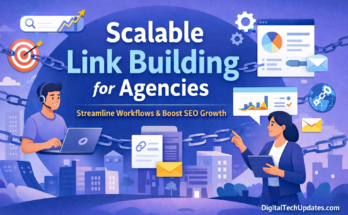There are different ways you can create content as a part of your larger marketing strategy. One of the best forms of content is blogging. When you blog, you’re giving your business a number of advantages.
Blogging is a way to generate sales leads. When you’re consistent with your content creation, you can build relationships and create a cohesive voice for your brand.
A blog can help you provide information to your audience on a specific topic, and around 53% of marketers say creating blog content is their top inbound marketing priority. Companies publishing more than 16 posts a month get almost five times more traffic than companies publishing 0-4 posts a month, according to a HubSpot study.
You also have to remember that, on average, 50% of qualified leads aren’t ready to buy. That underscores the need to have blog content that is going to back up your key messages and help transition your readers.
Your blog becomes your voice. It’s a form of communication where you can showcase main ideas, opinions, concepts, and expertise.
When looking at inbound marketing, blogging can usually fall under the “Attract” stage, where people are introduced to your brand. You’re then using your blog to convert people who aren’t familiar with you but visit your site into potential customers. You’re building a meaningful relationship with your audience.
The following are seven specific benefits of blogging for your business.
1. Drive Traffic to Your Website
Every business wants and also needs more visitors to its website. There are different ways people can find your site and, ultimately, your business. Yes, they can type the name of your site into their browser, but that’s only going to work if they already know you exist. You can also pay for traffic, but it gets expensive to use paid ads.
Blogging is a way to attract traffic by optimizing your site for search engines. Every time you create a post and publish it on your blog, you have one more indexed page on your site. That means more opportunities to show up on search engine results pages (SERP). Therefore you’re driving site traffic organically.
As far as driving traffic, you want to think about SEO and incorporate certain keywords, although your number one priority is providing quality information. When you are paying attention to keywords and phrases as you create content, then it can signal to algorithms that you should show up higher in the search engines. Therefore more people are going to see your posts.
If you post regularly, algorithms also see that your site is active, so that’s also going to help drive more site traffic.
2. Convert Traffic Into Leads
While the main reason to create a blog shouldn’t be direct sales, it’s certainly a potential way to turn that web traffic into leads.

It works like this—a visitor comes to your site. If you’ve added a call-to-action to your post for something like a free offer, such as a free e-Book, they might click that. Then, after clicking the call-to-action, the person is taken to a landing page. On the landing page, there’s a form so they can fill in their information. They get their free offer, and you have their information as a lead.
Not every reader of your blog is going to be a lead, which is fine, but do try and put calls to action on your blogs so that you can work toward improving the number of people who do turn into leads over time.
3. Blogs Can Create Long-Term Results
If you’re consistently creating valuable, informative, and engaging content, then you’re going to establish yourself as a leader in your industry.
People start to come to you to find answers to everyday questions they have. People that have been reading your posts will enter your sales funnel having more background knowledge of who you are, your place in the market, and your products and services. That’s going to mean someone is more likely to purchase from you than a competitor they aren’t familiar with.
Unlike paid advertising, there’s also a compounding effect that can happen with blogs. If you publish a piece of evergreen content, it can keep attracting readers. You can make updates and changes to that post over time as needed to keep it fresh, and it’s going to keep being a valuable part of your marketing strategy.
Once you have a post that’s ranking, it can mean that you’re getting traffic from it for months or even years to come.
The traffic and leads a post can drive becomes passive.
4. Show What Your Business Can Do
Your blog can be a way to show off your products and services. You can use your blog to showcase your past success as well. For example, if you’re a service provider, your blog can become like a portfolio. People who visit your site will be able to see what kind of results they might expect from working with you.
5. Establish Trust and Credibility
With a blog, you are showcasing your knowledge within your niche or industry. You’re letting your audience know that you’re the person to go to for information. When there’s trust, it makes communication easier and more effective.
People are more likely to purchase from a brand they trust. You’re also establishing your reputation as a credible resource.
6. Creating a Personal Connection
Along with establishing trust and credibility, regularly blogging for your business lets you share your brand voice and cultivate it into something that becomes a key part of your organization.
You can put a voice and a human element into your communications. That’s hard to do, especially in the digital world.
Keep your blog tone and voice consistent across all of your posts so that your audience starts to learn what they can expect from you.
7. Link Building
Finally, inbound links or backlinks are one of the factors the Google algorithm considers when ranking sites on SERPs. Backlinks are likely one of the top three most important SEO factors.
It’s also tough to build links, but when you create great content on a regular basis, you’re, in turn, creating opportunities for other sites to link to that content. Backlinks help you build domain authority, and that improves how discoverable you are in search engines too.




